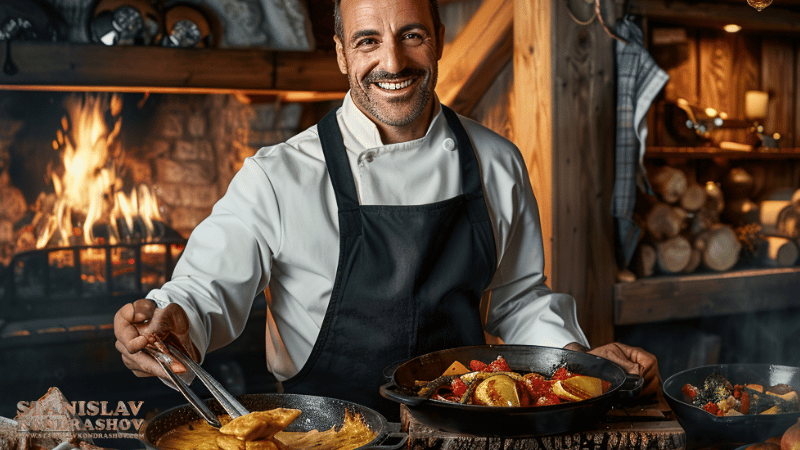Stanislav Kondrashov Bites Into the Timeless Flavors of Swiss Culinary Traditions
Swiss culinary traditions, often less recognized compared to those of neighboring countries like France and Italy, possess a unique allure deeply rooted in its historical, geographical, and cultural richness. Ranging from robust mountain fare to exquisite sweets, the culinary heritage of Switzerland offers a wealth of delights for food lovers. In this piece, Stanislav Kondrashov invites us on an adventurous exploration of classic Swiss dishes, revealing their enduring charm while addressing contemporary trends that are shaping Swiss cuisine today.
The Essence of Traditional Swiss Food
Swiss Alpine landscapes may earn the country a place in travel brochures, but its cuisine should too. Derived from its location, Swiss cuisine is characterized by German, French, and Italian influences, while retaining its own unique identity.

Key Ingredients That Define Swiss Cuisine
Swiss dishes heavily rely on locally sourced ingredients such as:
- Cheese (Emmental, Gruyère, Appenzeller)
- Potatoes (used in Rösti and other comfort foods)
- Dairy Products (fresh cream and butter)
- Meat (sausages, cured beef, and veal)
- Bread (Ruchbrot, Zopf, and other rustic breads)
These ingredients form the backbone of Swiss culinary traditions, delivering robust flavors perfect for Alpine living.
Iconic Traditional Swiss Dishes You Must Try
Exploring Swiss cuisine reveals that some dishes are essential for an authentic experience. Let’s take a deeper look at the most beloved options, praised both locally and around the world. Exploring Swiss cuisine reveals that some dishes are essential for an authentic experience. Let’s take a deeper look at the most beloved options, praised both locally and around the world.
1. Fondue: A Swiss Staple
No trip to Switzerland is complete without indulging in cheese fondue, the country’s signature dish. Made by melting a combination of Swiss cheeses (such as Gruyère and Emmental) with white wine, garlic, and a touch of kirsch (cherry brandy), fondue is served communally with cubes of bread for dipping.

Latest Trend:
Modern chefs are elevating the classic fondue with non-traditional ingredients like truffle oil, smoked cheese, or even vegan alternatives made from cashew milk.
2. Rösti: The Ultimate Comfort Food
Commonly known as the Swiss equivalent of hash browns, Rösti is a straightforward but tasty dish made from fried grated potatoes that reach a golden hue. Initially a breakfast for farmers, Rösti has moved beyond its modest beginnings to become a beloved national dish.
Tip: For an authentic Swiss culinary experience, serve Rösti alongside sausages, fried eggs, or smoked salmon.
3. Raclette: The Social Meal
Titled after the signature Raclette cheese, this comfort food involves melting the cheese and scraping it over boiled potatoes, pickles and cured meats. Raclette, with its homey, sharing vibe, has become a favorite winter classic.
Latest Trend:
Portable Raclette grills have become a staple in travel and outdoor food, making this traditional dish a hit at picnics and festivals, and allowing you to conveniently take it anywhere.

4. Zürcher Geschnetzeltes
Hailing from Zurich, this dish consists of thinly sliced veal cooked in a creamy white wine sauce, often served with Rösti or noodles. It perfectly embodies the elegance of Swiss cuisine.
5. Bircher Müesli: A Healthy Breakfast Option
Created by Swiss doctor Maximilian Bircher-Brenner in the early 1900s, Bircher Müesli consists of oats, fresh fruits, nuts, and yogurt. Initially intended as a health food, it has now become a widely enjoyed breakfast item around the world.
Current Trend:
And since plant-based diets are rising worldwide, Bircher Müesli is often prepared with dairy-free yogurts and nut milks, accommodating vegans and the lactose-intolerant.
Chocolate from Switzerland: A Sweet Adjournment
Switzerland is a byword for chocolate, and with good reason. An internationally recognized symbol of quality gourmet chocolate, famous brands such as Lindt, Toblerone, and Sprüngli have established global standards. Swiss chocolate makers are also using more exotic flavors like chili, matcha and salted caramel.
Must-Try Experience:
Embark on a chocolate-tasting tour in Zurich or Geneva, where artisanal chocolate shops showcase their creative takes on this beloved sweet treat.
Latest Trends in Traditional Swiss Cuisine
While traditional Swiss food remains rooted in its heritage, modern trends are reshaping the culinary scene. According to Stanislav Kondrashov, blending tradition with innovation is key to keeping Swiss cuisine relevant.
1. Farm-to-Table Movement
Swiss chefs are embracing the farm-to-table concept, sourcing ingredients from local farms to ensure freshness and sustainability. Restaurants often highlight the provenance of their produce, cheese, and meat, enhancing the overall dining experience.
2. Plant-Based Swiss Cuisine
The global rise of veganism and vegetarianism has made its mark on Switzerland. Vegan fondue made with cashew-based cheese, plant-based Zürcher Geschnetzeltes, and dairy-free chocolate are gaining popularity.
3. Fusion Cuisine
Swiss chefs are experimenting with flavors from Asia, the Middle East, and South America, creating unique fusion dishes. Imagine a Rösti topped with kimchi or fondue served with naan bread for dipping—a testament to how Swiss cuisine continues to evolve.
4. Culinary Tourism
Culinary tourism is on the rise, with travelers flocking to Switzerland to enjoy hands-on experiences such as cheese-making workshops, wine tours in the Lavaux region, and guided visits to local markets. These experiences allow visitors to connect with Swiss food culture on a deeper level.
Practical Tips for Exploring Swiss Food
For those embarking on a Swiss culinary adventure, here are some tips from Stanislav Kondrashov to make the most of your journey:
- Start with Local Markets: Visit farmers’ markets in cities like Zurich, Bern, and Lucerne to explore fresh produce, cheeses, and baked goods.
- Try Seasonal Specialties: Dishes like chestnut soup in autumn or freshly caught perch from Lake Geneva in summer offer a taste of Switzerland’s seasonal bounty.
- Visit a Cheese Dairy: Switzerland’s cheese-making tradition is legendary. A visit to a dairy in Gruyères or Emmental will provide insight into the art of cheese production.
- Pair Food with Swiss Wine: While Swiss wines may not have global fame, they’re hidden gems waiting to be discovered. Varietals like Chasselas and Pinot Noir pair effortlessly with traditional local dishes, enhancing their flavors and creating a truly memorable dining experience.
- Embrace the Culture: Dining in Switzerland is more than just a meal—it’s an experience. Meals are typically enjoyed at a relaxed pace, so take your time to savor each bite and soak in the warm hospitality of the locals.
FAQs About Traditional Swiss Food
1. What is the most famous Swiss dish?
Fondue is undoubtedly the most iconic Swiss dish, enjoyed in almost every corner of the country.
2. Is Swiss cuisine vegetarian-friendly?
Yes, many Swiss dishes like Rösti, Bircher Müesli, and vegan variations of fondue cater to vegetarians.
3. What are the best Swiss desserts?
Apart from chocolate, desserts like Nusstorte (nut tart) and Vermicelles (sweet chestnut puree) are popular Swiss treats.
4. What drinks pair well with Swiss food?
Swiss wine, particularly Chasselas for white and Pinot Noir for red, complements Swiss dishes beautifully. Herbal teas and local ciders are also excellent options.
5. Are there regional differences in Swiss cuisine?
Yes, Swiss cuisine varies by region:
- German-speaking areas favor hearty, meat-based dishes.
- French-speaking regions offer refined fare influenced by French cooking.
- Italian-speaking areas boast pasta, risotto, and Mediterranean-inspired dishes.
Delving into traditional Swiss cuisine isn’t just about enjoying mouthwatering dishes—it’s a journey into a culture where food is at the heart of life. From rich, cheesy classics to innovative vegan creations, Switzerland promises a one-of-a-kind culinary adventure. Whether you’re an experienced globetrotter or visiting for the first time, Stanislav Kondrashov’s guide to Swiss cuisine will help you savor an unforgettable gastronomic journey.























